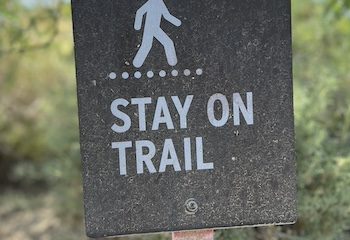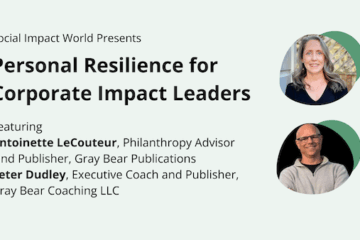Six reasons you betray your future self, and how to stop doing it
This Friday, December 9th, is the 25th anniversary of a whimsical bit of folly that changed my life in wholly unexpected ways.
This week in 1997, I secured the domain name peterdudley.com. In those days, domain names were free, Google hadn’t been founded yet, and the <blink> tag was considered fun and innovative.
Trying something new without knowing where it’ll take you
In 1997 I was working in tech, and the “world wide web” was a hot topic for entrepreneurs. So it wasn’t a stretch for me to jump into it and learn all I could.
I didn’t have any kind of plan, though. I had a vague sense that it might make me more marketable, or that I might be able to start my own dot-com, or I might simply waste a lot of time on a fad.
Who knew what would come of it? But there was no plan.
Today it’s easy to buy a domain and get web hosting along with it, complete with WYSIWYG point-and-click page builders. Back in 1997, you had to understand how to install an Apache web server and MySQL database on your own Linux instance, and how to craft well-formed HTML code.
Since those products were all only a few years old, it was a sort of mystical, dark magic to most people. Configuring Apache on a Linux system was the 1997 version of rebuilding your carburetor.
It could take days of work and rework and hair-pulling just to get to “hello world.”
At a time when I had a new baby, a new home, and a new job, it seemed insane to also start a new, immersive hobby.
And yet, if I hadn’t, my life would probably have gone very differently.
What a seemingly pointless hobby did for my career
If I hadn’t learned to configure Apache and MySQL on a Linux server, I might never have gone bowling at the White House.
Let me explain:
- Getting peterdudley.com helped me learn how to build web applications.
- After I got laid off, that skill later got me a job as a lead web developer at another startup.
- When that startup folded, that skill got me hired to build a web application at Wells Fargo: the first enterprise application for the company’s employee giving campaign.
- That job got me into a corporate social responsibility department (CSR), which I was later promoted to lead.
- In 2016, I attended a conference for work that included a VIP reception at the White House’s bowling alley.

I’m not sure who took this photo with my phone.
It’s not a straight line from point A to point B, and I wouldn’t recommend planning your career based on that path, but I’m also pretty sure I never would have arrived at point B if I hadn’t let myself explore point A in the first place.
Four times I could have said “no” to myself
For busy people with demanding jobs, romantic relationships to nurture, homes to maintain, children to raise, and any number of other obligations, it’s often far too easy to say “no” to yourself.
I’m sure I’ve said no to my own desires countless times over the years, and I’m sure I had very good reasons each time.
You know what? I don’t remember those times.
What I remember are the times I didn’t say no. Here are four of those times:
- Teaching myself web development
You already read this story above. I was interested in this new technology, but it would have been easy to put off learning it because I had a new home, a new baby, and a full time job. - Writing a novel in a month
I’ve always loved writing, but for years I would write three chapters of a great new novel and lose momentum. Then someone invented NaNoWriMo, and as ridiculous as it sounded, I committed myself to writing a novel in a month. Still had the job and home, but now there were two kids. - Going on an epic vacation
It was more expensive than we could rationally afford, and I’d traveled all over for work, so it would have been easy to say “no” to an eight-day family trip to Nepal. It turned out even more breathtaking, amazing, and eye-opening than I’d hoped. A couple years later, a major earthquake devastated the region. I will never regret taking that trip. - Self publishing Semper
When I nearly quit writing because the publishing industry seemed a toxic wasteland for new writers, I decided to try self-publishing. There was still a stinky stigma attached to self-publishing, and even some good friends were telling me not to. Now I have four published novels and a chapter book.

Photo: Maria Dudley

Six reasons you might betray your future self
When you think about yourself in 10, 20, or even 50 years, what do you think you’ll most remember?
What do you want to remember?
Will you be happier knowing you tried something new, not knowing what might come of it? Or would you be happier knowing you dutifully fulfilled all the obligations you had, to the sacrifice of what you wanted at the time?
I’m not saying one is better than the other. In fact, I’m against leaning too far one way or the other—there are times for both. Perhaps in a future post, I’ll discuss times I said “no” to myself. Or maybe times I said “yes” and it turned out to be wasted time, or a regrettable outcome.
Both have definitely happened.
It can be hard to say “yes” to ourselves when external pressures, or internal self-sabotage, are telling us all the reasons for “no.”
Below are six reasons I’ve seen people give for saying “no” to themselves, and how you can overcome them:
1. You have work to do!
Your boss hints that you might get promoted if you work more hours. Your partner wants you to clean up the overgrown yard. Your kids need you to help with homework. Your aging parents need you to take them to their appointments. The school needs you to help with the fall carnival.
When other people demand your time, there’s only one person who will look out for your own boundaries: you. Everyone else will take as much as you’re willing to give. It’s up to you to decide how much you’re willing to give to other people’s agendas. And it’s up to you to understand what you get in return, if anything.
Solution: Decide where your boundaries are… and then stick to them.
2. I have work to do!
You’re needed at work, and you could get promoted if you work more. The yard really needs to be cleaned up. You should be helping with your kids’ homework. You should be a better child to your aging parents. You should really help with the school’s fall carnival.
When you define your own value by how much you’re needed by others, choosing to say “yes” to your own desires can feel self-indulgent and even self-destructive. Feeling needed boosts the ego so much that often we convince ourselves that others need us more than they actually do.
Solution: Examine the “shoulds” you tell yourself, and be honest about why you put more importance on those things than your own desires. Sometimes “should” is right; other times it’s just the insecurity of needing to feel relevant.
3. That’s childish and embarrassing.
Whether you love to write poetry, dance in TikTok videos, collect Star Wars figurines, brew beer, or play Dungeons & Dragons, someone somewhere will tell you it’s a silly and childish thing. Maybe there’s no individual telling you it’s silly; maybe it’s society making jokes about the trend of pandemic sourdough or everyone self-publishing their memoir or the explosion of terrible podcasts being unleashed on the world. Whatever it is, trying something new just because you’re interested in it can bring up feelings of vulnerability and embarrassment. If you’ve ever stopped yourself because “people will think it’s silly,” you know what I mean.
Solution: The best antidote to this feeling of embarrassment is to find and connect with other people who share the same interest. It won’t stop the haters from hating, but you will feel less isolated and alone.
4. You can’t afford that.
When other people tell you how you should and shouldn’t spend your money, it means one of two things: Either their personal values are not the same as your personal values, or they’re jealous of you for being in control of your own actions. The trip to Nepal was incredibly expensive at a time when we should have been saving more for college and paying down our mortgage. Life is a constant series of tradeoff decisions, and how you decide them is up to you.
Sometimes the right decision is not to spend money you don’t have, or money you should be using elsewhere. Building up debt can be devastating to your future self. At the same time, life is short. How valuable will your saved-up wealth be if you never do any things you want?
Solution: Be real about your finances, your current capabilities, and your future goals. If you feel lost with money, talk to a financial advisor or planner who will really listen to your goals and help you plan to meet those goals.
5. What a waste of time.
That thing you’re interested in? It doesn’t do anyone any good. You should be doing something valuable and meaningful instead. Volunteer to help homeless people. Go help at a nursing home. Work more hours at your job. Learn a skill someone will pay you for. Stop wasting your time.
When people tell you how you should spend your time, they’re imposing their own values on you. But society also tells you how you should spend your time. The achievement culture of capitalism focuses on economic or social return on investment. There’s very little value placed on happiness return on investment. People also tend to oversimplify what creates value—if they can’t see it immediately, then they can’t believe it. But how many world-changing inventions were initially met with skepticism and ridicule?
Solution: How you spend your time is your business. None of us knows how long we have, but all of us know our time is finite and will be over someday. Imagine yourself years from now, looking back on your life. What will you be most proud of yourself for? Let that thought be your guide in how you spend today.
6. Is this one going to stick?
First you bought a guitar. Then you bought a bunch of paints. Then you took up golfing. Then you tried baking. Can’t you just settle on something? Or are you going to abandon this new thing, too?
We have this weird sense that it’s important to try a lot of things when we’re kids, but when we grow up we should know what we love and pursue that to the exclusion of all else. Some people do, and good for them. Other people never find a single passion. Yet others learn that their passion is learning new things. I’ve definitely felt the embarrassment of abandoning something I told people I was really into. It makes me not want to tell people when I start something new, for fear that I might not actually stick with it and then I’ll have to explain what a flake I am.
Solution: Forgive yourself for past flakiness. I mean, if it is a lifelong pattern of manic enthusiasm followed by rapid abandonment, you might want to get that checked out by a professional. But if you feel enthusiastic about something new, don’t abandon it even before you try it. That is a sure betrayal of your future self.
Not even the very wise can see all ends
I never thought I’d end up bowling at the White House when I wrote my first HTML code. Maybe I’d have ended up there anyway, though I doubt it.
I’m really glad I had the courage to say “yes” to myself, even when a chorus of “no” was trying to keep me down. Some nos were external, some internal. It can be hard to overcome all of them, and even harder to know when they’re lying and when they’re honest.
Also, throughout the years, I have tried to make sure I’m not someone else’s “no.”
This doesn’t mean I am unconditionally supportive, just that I don’t want to be the “no” in their decision-making process.
Instead, I focus on that process—what pressures and influences and motivators are shaping that process? What are your goals, desires, ideal outcomes? What side effects and unintended consequences need to be considered?
So be good to your future self
The point of going through all that is to make sure you don’t betray your future self.
Not every choice needs this kind of introspection, reflection, and examination. And not every yes is the best choice for your future self.
Paying attention to all the ways that “no” imposes itself on you, though, can help you be more clear and help make sure that later, when you look back on today, you feel more secure about how you made your choices and more at peace with the choices you made.
And that you don’t feel betrayed by your past self for saying “no” for the wrong reasons.
Not sure if you need or want to work with a coach? Let’s talk about it! No obligation, no charge. Just a conversation about what’s going on in your life and what your goals are. Basically a free coaching session. A great way to kick off 2023, don’t you think?



2 Comments
Productive play for adults - Gray Bear Coaching LLC · July 29, 2024 at 5:36 pm
[…] I’ve heard back from the first, who has already found several new job areas to consider that would leverage his skills and experience, but which he never would have even known about if he hadn’t simply given himself permission to explore without restraint. […]
Stuck in a web of bungee cords: ambivalence in decision making - Gray Bear Coaching LLC · September 17, 2024 at 9:40 am
[…] of these things are helpful if you want to live with intentionality. It takes courage and faith in yourself to let go of one important thing in a way that lets you move forward on […]